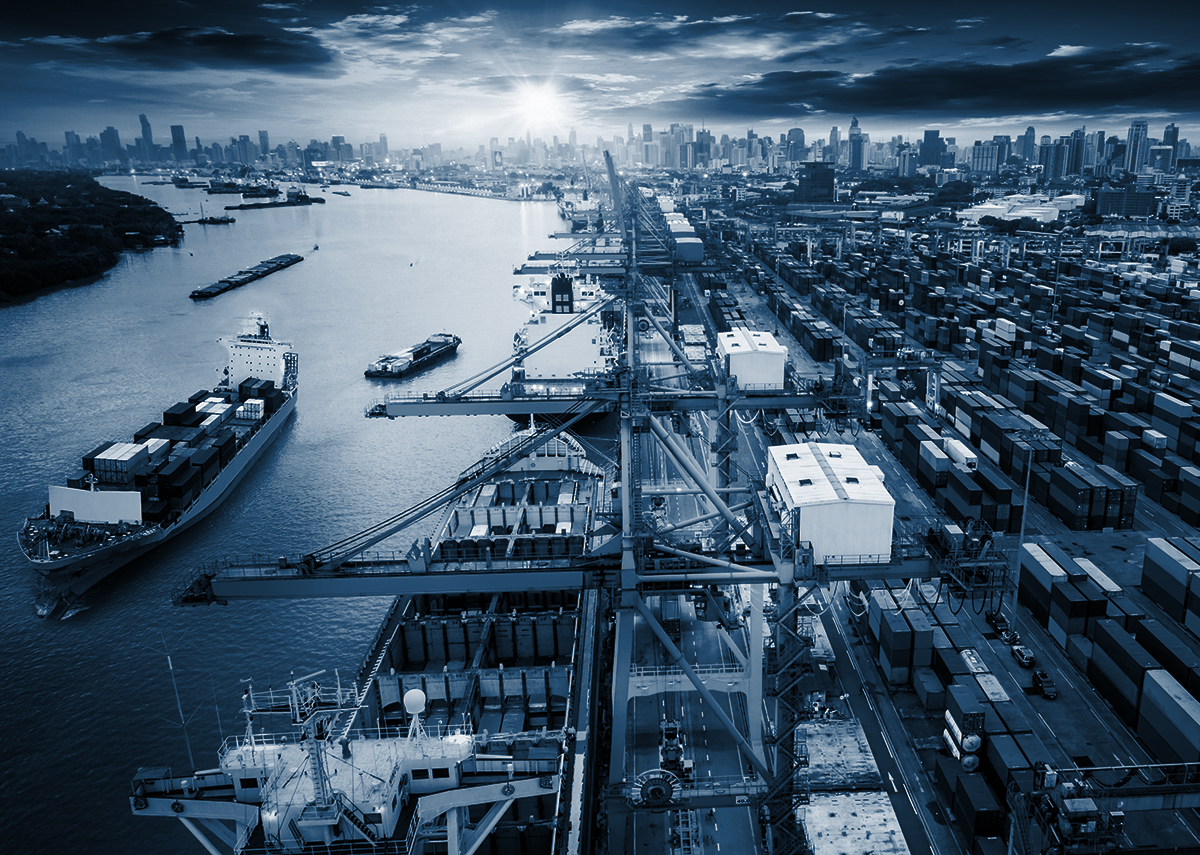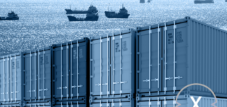
Fragile supply chains: Supply chain under pressure – Image: Xpert.Digital / Travel mania|Shutterstock.com
Fragile supply chain
Global supply chains have come under severe pressure in the past two years. This is shown by the graphic based on data from the Federal Reserve Bank of New York . As a result, the index shows particularly strong swings during the pandemic. In the period from October to December 2021, the index exceeded the 4-point mark. According to reports, the disruption caused by Russia's war of aggression against Ukraine will continue to intensify, particularly in Europe. the German Transport Forum, the war and the sanctions decided by the West will have far-reaching effects on the transport of relief goods, the transport of refugees and the conduct of foreign trade in Europe. The processing of foreign trade in Europe is currently extremely complicated: there are massive disruptions in the supply chains, overloaded border crossings, blocked transport routes and an impending energy shortage.
Global supply chains are still strained by the pandemic. Many countries have introduced numerous anti-pandemic measures, which have caused severe delays in value and supply chains. For example, control and quarantine zones in logistical hubs have led to delivery backlogs of goods. As a result, many supplier companies were hindered in their production and were no longer able to fully meet their delivery obligations. And missing supplier parts can quickly have a massive impact on production processes. Added to this are the absence of workers due to illness or travel restrictions.
Need for action to ensure supply chains continue to function
According to the DVF – German Transport Forum, there is a need for action regarding sustainable changes in the logistics supply chains:
Changes in logistics chains and hubs
The processing of foreign trade in Europe is currently extremely complicated: there are massive disruptions in the supply chains, overloaded border crossings, blocked transport routes and an impending energy shortage.
A lack of deliveries of primary products from Ukraine also leads to limited production capacity in other European countries and Germany and thus changes the export and import volumes here too. The Russian market is currently no longer served by almost all major shipping companies, freight forwarders and courier and express service providers. In addition, transport costs in Europe are rising significantly: high oil and gas prices, extended waiting times due to embargo controls, more difficult personnel scheduling and detours, for example due to the closure of Russian airspace, are the main causes.
Need for action
- A Europe-wide coordinated political approach and uniform rules as well as facilitation for transport are necessary in order to maintain supplies and supply chains and to minimize uncertainties about sanction regulations and their controls.
- The industry needs uniform, transparent EU-wide rules regarding transshipment, embargo requirements, blockages for Russian ships and border crossing regimes.
- Similar to aid deliveries, any simplifications must be taken into account in order to make cross-border transport easier. What is important, among other things, is the greater digitalization of reporting procedures, simplification of Covid test requirements and green lanes.
- Restrictions on Sundays and public holidays as well as easing driving and rest times are necessary to keep traffic flowing. In order to leverage all existing potential, the cabotage rules need to be simplified. The lack of a CEMT permit is also critical for Ukrainian trucks.
- Infrastructures under the responsibility of the federal and state governments must be subject to the same regimes and regulations, which is particularly clear in the case of federal waterways and state-owned port infrastructures.
- In view of the development of energy prices, caps or supports must be examined.
Impending supply chain lockdown
Infection Protection Act needs to be improved:
Berlin, November 22nd, 2021 - The innovations in the Infection Protection Act regarding 3G regulations in the workplace and the 3G requirement in public transport will come into force on November 24th, 2021. The regulations are not practical to implement for the mobility and logistics sector. Dr. Florian Eck, Managing Director of the DVF:
“The 3G regulation for workplaces newly prescribed in the Infection Protection Act makes sense for stationary workplaces. In the mobile sector there is a threat of a lockdown of the supply chains. It becomes particularly problematic when it comes to cross-border deliveries. The staff is often immunized with vaccines that are not approved in Germany, and testing before delivery is not possible. The previously justified exemption of transport personnel from the testing requirement is now effectively invalid. This means that company premises and logistics centers cannot be accessed or accessed, and the supply chains are paralyzed.”
“Pragmatic exceptions for transport staff are now important. Since March 2020, the companies have successfully set up lock concepts and developed their own hygiene standards. You have to build on that. Analogous to the entry regulations, transport employees must be exempt from the test requirement if their stay in the respective company premises is only temporary and hygiene and protective measures are taken. The lock concepts usually also provide for separate toilets for external transport staff. This solution is also put at risk by the new law. At the same time, testing capacities at the borders must be expanded.”
From Wednesday onwards, due to federal law, only those who have been vaccinated, those who have recovered and those who have tested negative for Corona will be allowed to be transported in public transport. Eck said: “The 3G requirement for passengers on buses and trains comes into force without the federal government having committed to actively supporting the measures. The transport companies are left alone with the new regulations of the Infection Protection Act. There are no resources for the controls that are now necessary, to the extent that they are even possible in an open system. The federal government must take action here, for example by having the federal police take over control tasks in public transport. At this point it is also clear that in the wake of the ongoing fourth wave, an expansion of the rescue package after 2022 will be necessary.”
“It is now the task of the executive federal government, in particular Federal Labor Minister Hubertus Heil and Federal Health Minister Jens Spahn, to act quickly and pragmatically. Time is of the essence, the new rules will apply from November 24, 2021. If there are no exceptions, this time there will be no risk of traffic jams at the borders, but at the gates of the logistics centers. When it comes to public transport, it’s about involving the federal police in control concepts, and that too needs to be decided as quickly as possible.”
Solve delivery problems sustainably - reorganize the supply chain
- Increasing safety stocks – buffer stock
- Regional decentralized warehouses/logistics centers
- Regional logistics distributors (microhubs)
- Use of high-bay warehouses or automated pallet high-bay warehouses (HRL)
- Suppliers in different regions, avoiding single sourcing
- Establishment/expansion of supply chain management with skills
- Expanding Supply Chain Visibility – Supply chain visibility (SCV) is the ability to track the supply as it moves from supplier to manufacturer to consumer
Another important point for the supply chain is increasing flexibility:
- Establishing security of supply
- Consistent planning processes
- Flexible manufacturing and assembly network
- Management of new product launches
- Customer focus through supply chain segmentation
- Unified supply chain structures
- Lean processes
- Human resources and talent management
Supply chain flexibility:
- Manage supplier risk better
- Plan holistically
- Make construction more flexible
- Adapt product strategies faster
Suitable for:
Xpert.Digital – Konrad Wolfenstein
Xpert.Digital is a hub for industry with a focus on digitalization, mechanical engineering, logistics/intralogistics and photovoltaics.
With our 360° business development solution, we support well-known companies from new business to after sales.
Market intelligence, smarketing, marketing automation, content development, PR, mail campaigns, personalized social media and lead nurturing are part of our digital tools.
You can find out more at: www.xpert.digital – www.xpert.solar – www.xpert.plus

